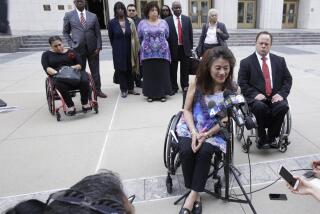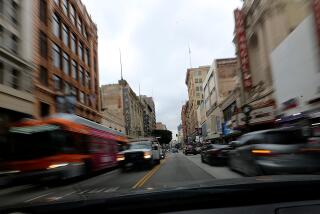City Inspectors Say Theater Meets Disability Access Laws
- Share via
Despite complaints that the newly built AMC theater complex in Woodland Hills does not properly accommodate wheelchairs, Los Angeles city inspectors said Wednesday that the theater meets state disability access laws.
The complaints were made by two members of the city’s Commission on Disability who said the design of the $14-million, state-of-the-art theater ignored the needs of wheelchair users.
Commission members Kirk Kilgour and Norma Vescovo complained that the spaces reserved for wheelchairs are unacceptable because they are either in the front row or the back of the theater, where the view is blocked.
But Henry Porter, principal building inspector for the Building and Safety Department’s disabled access section, said he inspected the theater last week and found it met the state codes on wheelchair access.
“There were no violations to the wheelchair location and seating requirements under that code,” he said in a report submitted to the commission Wednesday.
Theater executives hailed the report.
“We are pleased that the Building and Safety Department confirmed that the AMC Promenade 16 Theater meets all standards associated with wheelchair accessibility,” said Dick Walsh, senior vice president for AMC’s West Coast operations.
But commission members and disabled activists rejected Porter’s report, saying the theater does not meet the spirit of the state’s disability laws.
“It was also in compliance in the past to make people sit in the back of the bus,” said Kilgour, who asked city inspectors to investigate the theater after he tried to watch a movie there recently.
Vescovo agreed, saying, “If you want to call that accessible seating . . . I want to call it something else.”
William Bolte, a writer who uses a wheelchair and has also visited the theater, told the commission that he has already asked the city attorney’s office, the district attorney and the Justice Department to investigate whether the theater meets the federal Americans with Disability Act.
Porter told the commission that the city does not enforce the ADA but suggested that the commission can urge the state to rewrite the state code on wheelchair access.
“We don’t write the code, we just enforce it,” he said.
More to Read
Sign up for Essential California
The most important California stories and recommendations in your inbox every morning.
You may occasionally receive promotional content from the Los Angeles Times.











